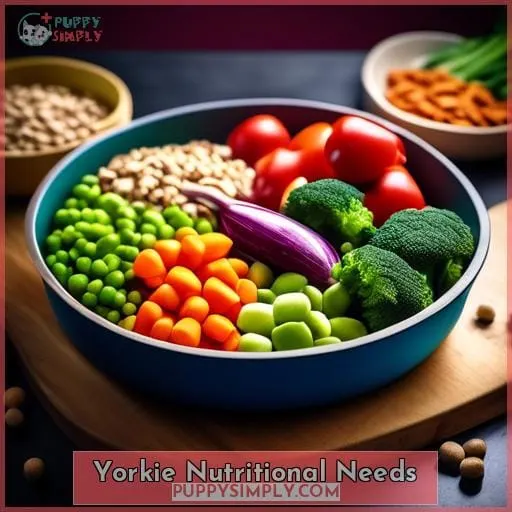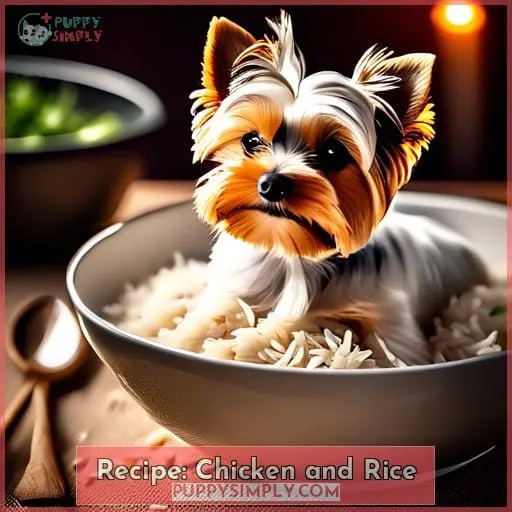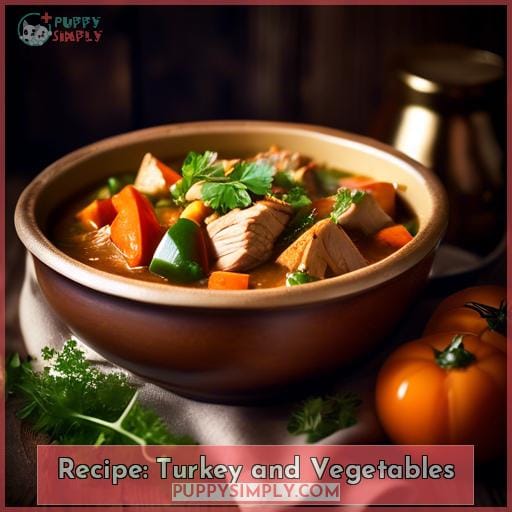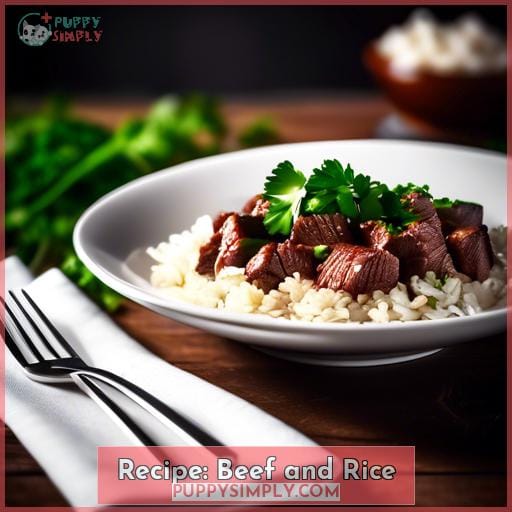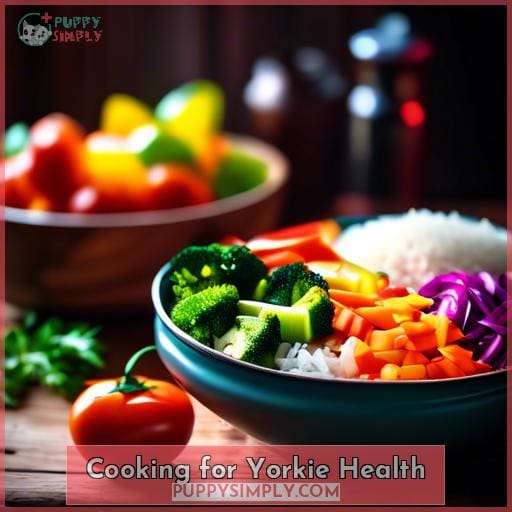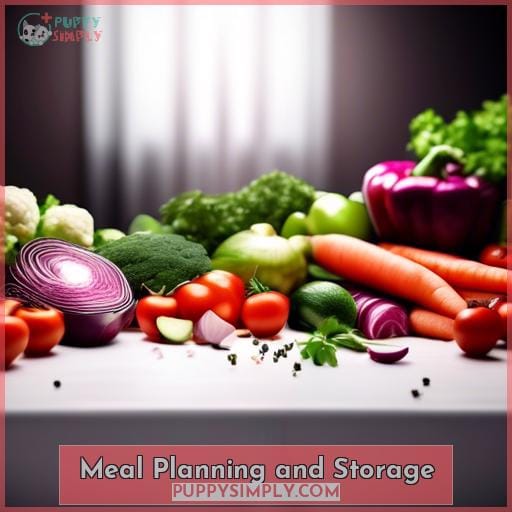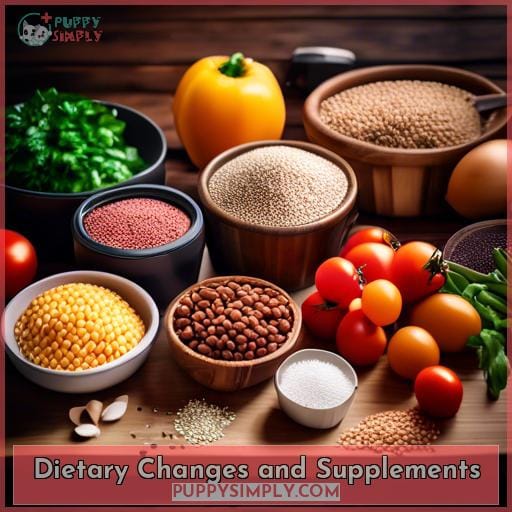This site is supported by our readers. We may earn a commission, at no cost to you, if you purchase through links.
 Imagine your Yorkshire Terrier, Bella, thriving on a diet tailored just for her. You’re not alone in wanting the best for your Yorkie, and homemade food offers a path to optimal health and vitality.
Imagine your Yorkshire Terrier, Bella, thriving on a diet tailored just for her. You’re not alone in wanting the best for your Yorkie, and homemade food offers a path to optimal health and vitality.
This guide dives into the nutritional needs of your furry friend, exploring proteins, fats, and more, while also providing allergen-free, customizable meal options.
Join a community of Yorkie owners who’ve discovered the benefits of homemade food, ensuring their companions lead happy, healthy lives.
Table Of Contents
- Key Takeaways
- Yorkie Nutritional Needs
- Homemade Food Benefits
- Cooking Safety Tips
- Recipe: Chicken and Rice
- Recipe: Turkey and Vegetables
- Recipe: Beef and Rice
- Cooking for Yorkie Health
- Homemade Treats
- Meal Planning and Storage
- Dietary Changes and Supplements
- Frequently Asked Questions (FAQs)
- How can I ensure my Yorkshire Terrier’s homemade diet is complete and balanced without using commercial dog food vitamins and supplements?
- What are the signs of food allergies or intolerances in Yorkies, and how can I adjust their homemade diet accordingly?
- How often should I introduce new ingredients into my Yorkie’s homemade diet to prevent digestive upset?
- Can homemade diets meet the specific needs of Yorkies with chronic health conditions like pancreatitis or kidney disease?
- What are the best practices for transitioning my Yorkshire Terrier from a commercial dog food diet to a homemade diet to ensure their digestive system adapts well?
- Conclusion
Key Takeaways
- High-quality proteins, healthy fats, complex carbohydrates, and fiber are crucial for Yorkshire Terriers’ nutrition, supporting energy levels, muscle maintenance, coat health, digestive health, and overall well-being.
- Homemade food for Yorkshire Terriers offers customizable, allergen-free options that can cater to specific dietary needs and preferences, enhancing the pet-owner bond and ensuring a balanced diet tailored to the dog’s unique requirements.
- Cooking homemade meals for Yorkshire Terriers requires careful consideration of ingredients to avoid common allergens and toxic foods, with a focus on natural, whole foods and limited ingredient formulas to prevent adverse reactions.
- Consulting a veterinarian or a veterinary nutritionist is essential when preparing homemade meals for Yorkshire Terriers to ensure the diet is nutritionally balanced, safe, and tailored to the dog’s age, weight, and health conditions.
Yorkie Nutritional Needs
When considering homemade food for your Yorkshire Terrier, it’s essential to focus on proteins, fats, carbohydrates, and fiber, as well as vitamins and minerals.
Your Yorkie’s diet should be rich in high-quality proteins like chicken or turkey to support their energy needs and muscle maintenance.
Carbohydrates from sources like brown rice provide energy, while fats are necessary for a healthy coat and overall well-being.
Proteins and Fats
Proteins and fats are essential components of your Yorkie’s diet, providing the necessary amino acids and energy for their overall health and activity.
- Lean protein sources like chicken and turkey support muscle growth and repair.
- Healthy fats from fish oil enhance your Yorkie’s coat sheen and joint health.
- Dietary fats offer concentrated energy, keeping your little companion playful.
- Fat sources should be carefully chosen to prevent weight gain.
Carbohydrates and Fiber
While fats and proteins are essential components of your Yorkie’s diet, carbohydrates and fiber also play a crucial role in ensuring they’ve the energy and digestive health they need.
| Carbohydrate Source | Fiber Source |
|---|---|
| Brown Rice | Sweet Potatoes |
| Barley | Broccoli |
| Quinoa | Kale |
| Oats | Apples |
| Peas | Carrots |
Complex carbs support energy levels, while fiber aids in nutrient absorption and promotes a balanced diet for optimal yorkie health.
Vitamins and Minerals
In transitioning from discussing carbohydrates and fiber to the importance of vitamins and minerals in a Yorkshire Terrier’s diet, it’s crucial to understand that these nutrients play a pivotal role in ensuring your Yorkie’s health and vitality.
You’ll need to ensure their meals aren’t only filling but also rich in essential vitamins and minerals to support their overall well-being and address their specific dietary needs.
Homemade Food Benefits
When you opt for homemade meals for your Yorkie, you’re choosing allergen-free options that can be tailored to your pet’s specific dietary needs.
You’ll have the flexibility to customize meals, ensuring they’re free from common allergens and suited to your dog’s unique preferences.
This approach to feeding not only supports your Yorkie’s health but also allows for a diet that’s as unique as they are.
Allergen-Free Options
Given that Yorkshire Terriers have unique nutritional needs due to their size and may have specific dietary restrictions, homemade food can offer allergen-free options that cater to these requirements.
- Hypoallergenic Ingredients: Select natural, whole foods known to be less likely to cause allergic reactions.
- Ingredient Substitutions: Replace common allergens with suitable alternatives to prevent adverse reactions.
- Sensitivity Testing: Identify safe foods through trial and error or veterinary-guided tests.
- Elimination Diets: Use limited ingredient formulas to isolate and eliminate problematic ingredients.
Customizable Meals
Beyond the benefits of allergen-free options, you can tailor homemade meals to your Yorkie’s specific tastes and dietary needs, ensuring they get the right balance of nutrients.
Experiment with ingredient variations and cooking techniques to create flavorful combinations that delight.
Nutritional adjustments keep their diet balanced, while meal presentation can make each homemade dog food serving a special event in your Yorkie’s day.
Cooking Safety Tips
When preparing homemade food for your Yorkshire Terrier, it’s crucial to prioritize their safety and nutritional balance. Avoid toxic foods like chocolate, xylitol, onions, and grapes, which can be harmful to dogs.
Ensuring a balanced diet is also essential; homemade meals should meet all your Yorkie’s dietary needs, including proteins, fats, carbohydrates, and essential vitamins and minerals.
Always consult with a veterinary nutritionist to create a meal plan that supports your dog’s health and well-being.
Avoiding Toxic Foods
While homemade meals can offer a healthier alternative to commercial dog food, it’s crucial to avoid ingredients that are toxic to dogs, such as chocolate, grapes, raisins, onions, and garlic, which can cause serious health issues.
Identifying toxins, choosing safe alternatives, pet-proofing your home, and educating caregivers about emergency preparedness enhance the quality of homemade food, free from harmful preservatives, dyes, and chemicals.
Balancing the Diet
When transitioning from avoiding toxic foods to ensuring a balanced diet for your Yorkshire Terrier, it’s crucial to remember that while steering clear of harmful ingredients is a good start, you also need to focus on providing a well-rounded meal.
You’ll want to make sure that each dish you prepare not only avoids the no-nos but also includes the right mix of proteins, fats, carbohydrates, and essential vitamins and minerals to meet your Yorkie’s nutritional needs.
This approach ensures that your homemade meals contribute positively to your dog’s health, avoiding nutritional deficiencies or imbalances that can arise from a diet lacking in variety or key nutrients.
- Ingredient Ratios: Adjust protein, fat, and carb levels to support your Yorkie’s energy and growth.
- Nutrient Balance: Include a variety of veggies and fruits for a spectrum of vitamins and minerals.
- Dietary Adjustments: Tailor meals to your dog’s age, weight, and health considerations to prevent obesity.
- Health Considerations: Consult a vet to align your Yorkie’s diet with any medical needs.
- Meal Planning: Organize a feeding schedule to maintain consistency and manage dog food costs.
Recipe: Chicken and Rice
To prepare a nutritious Chicken and Rice meal for your Yorkshire Terrier, start by gathering all the necessary ingredients.
| Ingredient | Amount | Substitution |
|---|---|---|
| Chicken breast, cooked & shredded | 1 cup | Ground chicken |
| Brown rice, cooked | 1 cup | Quinoa, barley |
| Carrots, steamed & chopped | 1/4 cup | Sweet potato |
| Green beans, steamed & chopped | 1/4 cup | Broccoli florets |
| Omega-3 oil | 1 tsp | Salmon oil |
When cooking, ensure chicken is fully cooked and vegetables are slightly softened. Mix ingredients together and allow to cool before serving. Vary proportions or substitute ingredients to accommodate your Yorkie’s preferences.
This nutritious recipe provides protein, complex carbs, vitamins, minerals, and heart-healthy fats tailored to your Yorkie’s nutritional needs.
Recipe: Turkey and Vegetables
After transitioning from the Chicken and Rice recipe, it’s time to focus on a nutritious option for your Yorkie with the Turkey and Vegetables recipe. This meal combines lean ground turkey with a variety of vegetables, offering a balanced and wholesome diet.
You’ll start by preparing the ingredients, which include 2 pounds of lean ground turkey, medium-sized carrots, and cups of diced green beans and apples. The process involves steaming the carrots and green beans until tender, lightly blending these steamed veggies and the diced apples separately, and cooking the turkey in a skillet with coconut oil until thoroughly cooked.
After draining any excess fat, you’ll pulse the turkey in a food processor, then mix it with the pulsed veggies and apples. Once cooled, add any recommended supplements before serving or storing. This recipe not only caters to the nutritional needs of your Yorkie but also introduces a variety of textures and flavors to keep mealtime interesting.
Recipe: Beef and Rice
You’ll find that preparing a beef and rice meal for your Yorkshire Terrier is a straightforward process that can provide them with the necessary nutrition they need. Begin by selecting high-quality, lean ground beef to ensure a good source of protein.
Cook the beef thoroughly, making sure to drain any excess fat, which is crucial for maintaining the right nutrient balance and avoiding digestive issues. For the carbohydrate component, opt for brown rice due to its fiber content, which aids in digestion.
When cooking, consider the cooking techniques that will preserve the natural flavors and nutrients of the ingredients. For instance, steaming the rice and simmering the beef can enhance the meal’s overall palatability.
Ingredient variations are welcome; you might include vegetables like peas or carrots to add vitamins and minerals. To cater to your Yorkie’s texture preferences, ensure the rice is cooked to a softness they enjoy.
Lastly, a dash of flavor enhancements like a spoonful of low-sodium broth can make the meal more appealing without compromising health.
Cooking for Yorkie Health
When cooking for your Yorkshire Terrier’s health, it’s crucial to consider their specific health conditions and monitor their weight and exercise closely.
Tailoring homemade meals can help manage or prevent health issues, ensuring they receive the right balance of nutrients.
Always consult with a vet to adjust their diet appropriately, keeping their unique needs in mind.
Addressing Health Conditions
Continuing from discussing the importance of a balanced diet, addressing health conditions in Yorkies through cooking involves understanding their specific dietary needs and potential health issues.
Specialized diets and nutritional therapy can be crucial for disease management.
By focusing on health-focused nutrition, you can tailor meals to meet dietary restrictions and support your Yorkie’s overall well-being.
Monitoring Weight and Exercise
Monitoring your Yorkie’s weight and exercise is crucial when tailoring their homemade diet to ensure they maintain optimal health.
- Exercise Tracking: Utilize apps or journals to record daily activity levels.
- Weight Management: Schedule regular weigh-ins to adjust food portions accordingly.
- Activity Levels: Match calorie intake with energy expenditure.
- Fitness Routines: Incorporate varied exercises to support overall health monitoring.
Homemade Treats
After exploring the importance of monitoring your Yorkie’s health through their diet, it’s essential to recognize that incorporating homemade treats into their regimen can be a delightful and nutritious way to reward them.
Homemade treats allow you to control the quality and quantity of ingredients, ensuring they’re safe and beneficial for your furry friend. Whether you’re training or simply spoiling your Yorkie, these treats can be tailored to avoid allergens and include health-boosting ingredients, making them a perfect complement to their meals.
- CBD Treats: Infuse treats with CBD for potential health benefits.
- Nutritional Benefits: Ensure treats offer vitamins and minerals for overall well-being.
- Flavor Varieties: Experiment with different flavors to keep your Yorkie interested.
- Ingredient Sourcing: Opt for fresh, high-quality ingredients for optimal nutrition.
Meal Planning and Storage
In the midst of preparing homemade treats for your Yorkie, it’s essential to consider meal planning and storage to maintain the freshness and nutritional value of the food.
Portion control is crucial; it helps prevent overfeeding and ensures your Yorkie gets the right amount of nutrients.
When preparing meals, incorporate a variety of ingredients to provide a balanced diet rich in essential vitamins and minerals.
Freezing techniques can be a lifesaver for busy pet parents. Freeze individual meal portions to retain nutrient quality and make feeding times quick and convenient.
Remember to label your containers with the date and contents, so you know exactly what you’re serving and can manage proper rotation to use the freshest meals first.
Proper storage and labeling practices help maintain the food’s quality and prevent waste, ensuring your Yorkie enjoys delicious and nutritious meals every day.
Dietary Changes and Supplements
When transitioning your Yorkshire Terrier to homemade food, it’s crucial to incorporate the right balance of nutrients.
High-quality dog food and supplements tailored for small breeds like Yorkies can meet their unique nutritional needs without the need for an additional multivitamin.
However, for those opting for homemade meals, incorporating supplements such as glucosamine, chondroitin, and MSM can support joint health.
Transitioning to Homemade Food
As you continue to explore homemade diets, slowly transition your Yorkie over a week, mixing increasing amounts of the new food with the old to prevent digestive upset.
Consult a veterinarian regarding supplements to fill nutritional gaps and ensure your pup gets all necessary nutrients during this change.
Key ingredients like proteins, fats, carbs, vitamins, and minerals may need substitution or supplementation to balance the diet.
Monitor your Yorkie throughout.
Recommended Supplements
When incorporating supplements into your Yorkie’s homemade diet, it’s important to select those that support their specific health needs without causing nutrient imbalances.
Supplement benefits vary, so dosage guidance and ingredient compatibility are crucial for maintaining nutritional balance.
Understanding the health implications of each supplement ensures your Yorkie receives the right nutrients to thrive, fostering a sense of community and understanding among Yorkie enthusiasts.
Frequently Asked Questions (FAQs)
How can I ensure my Yorkshire Terrier’s homemade diet is complete and balanced without using commercial dog food vitamins and supplements?
To ensure your Yorkie’s homemade diet is complete, include a variety of proteins, fats, carbohydrates, and cooked vegetables for essential nutrients.
Consult a vet for tailored advice.
What are the signs of food allergies or intolerances in Yorkies, and how can I adjust their homemade diet accordingly?
Watch for itchy skin, frequent ear infections, and digestive upset—these can be telltale signs of food allergies in Yorkies.
Adjust their diet by conducting an elimination trial, under veterinary guidance, to pinpoint the culprit.
How often should I introduce new ingredients into my Yorkie’s homemade diet to prevent digestive upset?
Introduce new ingredients into your Yorkie’s homemade diet every 2-3 weeks to prevent digestive upset. This gradual approach allows their system to adjust, ensuring they tolerate the new food well.
Correct any spelling, syntax, or grammar mistakes in the text.
Can homemade diets meet the specific needs of Yorkies with chronic health conditions like pancreatitis or kidney disease?
Yes, homemade diets can be tailored to meet the specific needs of Yorkies with chronic health conditions like pancreatitis or kidney disease, ensuring they receive the right balance of nutrients while avoiding ingredients that could exacerbate their condition.
It’s crucial to consult with a veterinarian to design a diet that addresses the dog’s unique health requirements.
What are the best practices for transitioning my Yorkshire Terrier from a commercial dog food diet to a homemade diet to ensure their digestive system adapts well?
Slowly introduce the new food over multiple days or weeks by mixing it with their current food. Start with more of their old food and gradually use less as their system adapts to digesting the homemade ingredients.
Monitor them closely during the changes for any digestive upset.
Conclusion
Crafting Yorkshire Terrier homemade food bridges the gap between nutrition and love, ensuring Bella thrives on meals designed just for her.
By embracing this guide, you’ve taken a significant step towards her health, offering allergen-free, customizable options that cater to her unique needs.
Your dedication to homemade meals promises a happier, healthier life for your cherished Yorkie.

